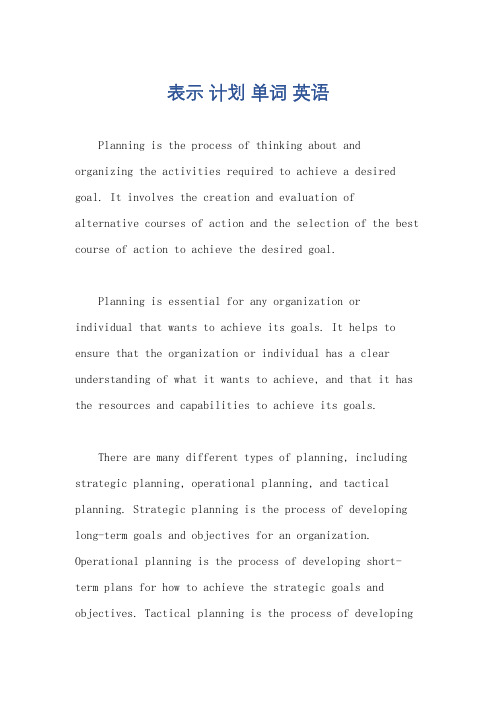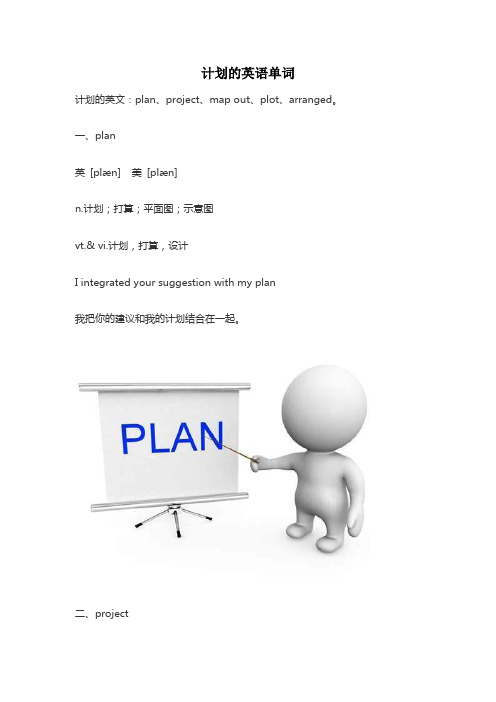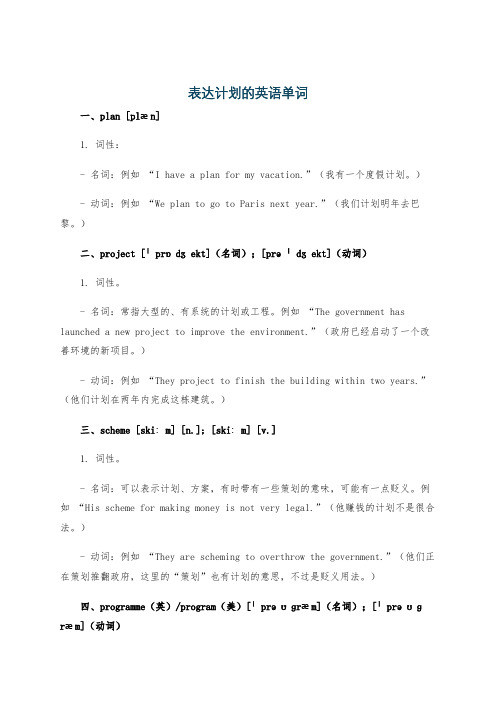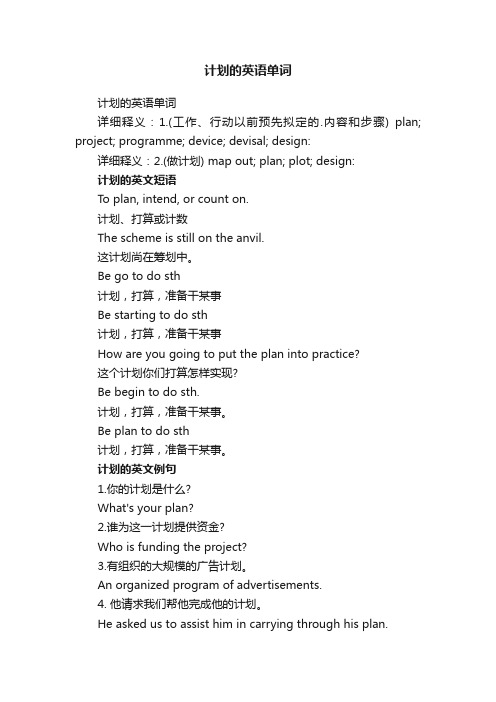英语词汇大全:计划-(厦门韦博英语分享)
分类词汇→法律→违法-(厦门韦博英语分享)

分类词汇→法律→违法-(厦门韦博英语分享)分类词汇→法律→违法-(厦门韦博英语分享)分类词汇→法律→违法crime 犯法offence 违法(美作ffense)attempt 未遂罪unfulfilment 未实现nonobservance 未遵守injustice 不法行为threat, menace 恐吓high treason 叛国罪adultery 通奸forgery, forging, counterfeiting 伪造perjury 伪证to bear false witness, to commit perjury 犯伪证罪attempted murder 谋杀未遂assassination, murder 暗杀,行刺homicide 杀人罪infanticide, child murder 杀婴罪assault and battery 殴打,侵犯人身罪kidnapping, abduction 诱拐,拐骗highjacking 劫持(飞机)piracy 海盗罪rape, violation 强奸conspiracy, plot 结伙阴谋,共谋theft, larceny 盗窃armed robbery 持械抢劫housebreaking, burglary 入室行窃contraband, smuggling 走私swindle 诈骗embezzlement 贪污公款prevarication 推诿bribery, suborning 行贿,受贿,贿赂breach of contract 违约,违反合同fraud 欺诈tax evasion 偷税misuse of authority 滥用职权corruption 贪污腐化usurpation 强夺blackmail 敲诈,勒索calumny, slander 诽谤intoxication 酗酒disturbance of the peace 扰乱治安分类词汇→法律→违法-(厦门韦博英语分享)。
表示 计划 单词 英语

表示计划单词英语Planning is the process of thinking about and organizing the activities required to achieve a desired goal. It involves the creation and evaluation ofalternative courses of action and the selection of the best course of action to achieve the desired goal.Planning is essential for any organization orindividual that wants to achieve its goals. It helps to ensure that the organization or individual has a clear understanding of what it wants to achieve, and that it has the resources and capabilities to achieve its goals.There are many different types of planning, including strategic planning, operational planning, and tactical planning. Strategic planning is the process of developing long-term goals and objectives for an organization. Operational planning is the process of developing short-term plans for how to achieve the strategic goals and objectives. Tactical planning is the process of developingdetailed plans for how to achieve the operational plans.The planning process typically involves the following steps:1. Identify the goal. The first step in planning is to identify the goal that you want to achieve. This goal should be specific, measurable, achievable, relevant, and time-bound.2. Gather information. Once you have identified your goal, you need to gather information about the current situation and the potential obstacles that you may face. This information can be gathered through research, interviews, and observation.3. Develop alternative courses of action. Once you have gathered information, you need to develop alternative courses of action for achieving your goal. These courses of action should be evaluated in terms of their feasibility, cost, and potential benefits.4. Select the best course of action. Once you have evaluated the alternative courses of action, you need to select the best course of action. This decision should be based on the criteria that you have established.5. Implement the plan. Once you have selected the best course of action, you need to implement the plan. This involves taking the necessary steps to achieve your goal.6. Monitor and evaluate the plan. Once you have implemented the plan, you need to monitor and evaluate the plan to ensure that it is achieving the desired results. If the plan is not achieving the desired results, you may need to make adjustments to the plan.Planning is an ongoing process that should be revisited regularly. As the situation changes, you may need to adjust your plans to ensure that you are still on track to achieve your goals.Benefits of Planning.There are many benefits to planning, including:Improved decision-making. Planning helps you to make better decisions by providing you with a clear understanding of your goals and objectives.Increased efficiency. Planning helps you to use your resources more efficiently by identifying the most effective way to achieve your goals.Reduced risk. Planning helps you to identify and mitigate potential risks that could derail your plans.Increased motivation. Planning helps to motivate you and your team by providing a clear path to achieving your goals.Improved communication. Planning helps to improve communication by providing a shared understanding of the goals and objectives of the organization or individual.Tips for Effective Planning.Here are a few tips for effective planning:Start with a clear goal. The first step in planning is to identify the goal that you want to achieve. This goal should be specific, measurable, achievable, relevant, and time-bound.Gather information. Once you have identified your goal, you need to gather information about the current situation and the potential obstacles that you may face. This information can be gathered through research, interviews, and observation.Develop alternative courses of action. Once you have gathered information, you need to develop alternative courses of action for achieving your goal. These courses of action should be evaluated in terms of their feasibility, cost, and potential benefits.Select the best course of action. Once you have evaluated the alternative courses of action, you need toselect the best course of action. This decision should be based on the criteria that you have established.Implement the plan. Once you have selected the best course of action, you need to implement the plan. This involves taking the necessary steps to achieve your goal.Monitor and evaluate the plan. Once you have implemented the plan, you need to monitor and evaluate the plan to ensure that it is achieving the desired results. If the plan is not achieving the desired results, you may need to make adjustments to the plan.Planning is an essential part of any successful organization or individual. By following these tips, you can improve your planning process and achieve your goals more effectively.。
计划的英语单词

计划的英语单词计划的英文:plan、project、map out、plot、arranged。
一、plan英[plæn]美[plæn]n.计划;打算;平面图;示意图vt.& vi.计划,打算,设计I integrated your suggestion with my plan我把你的建议和我的计划结合在一起。
二、project英[ˈprɒdʒekt] 美[ˈprɑ:dʒekt]vt.计划;放映;发射;展现,使突出vi.伸出,突出n.项目,工程;计划,规划;(学生的)课题In order to transform their environment, he drew up the project with 为了改造环境,他苦心孤诣地制订了这个计划。
三、map out英[mæp aut]美[mæp aʊt]在地图上标出;筹划[安排]某事;详细提出某事Map out your future but do it in pencil.要好好计划未来,但也必须随时应形势而变通。
四、plot英[plɒt] 美[plɑ:t]n.地基,基址图;(戏剧、小说等的)情节;一块地;测算表vt.密谋;以图表画出,制图;把…分成小块;为(文学作品)设计情节vi.设计作品情节;标示于图表上;密谋,暗中策划And officials have said they discovered a plot to attack the courtroom 官方说,他们发现了一个暴力分子攻击法庭的秘密计划。
五、arranged英[ə'reɪndʒd] 美[ə'reɪndʒd]adj.安排的v.安排,准备( arrange的过去式和过去分词);把…(系统地)分类;整理;改编(剧本等)We have arranged to hold the class meeting at seven this evening.我们已经计划好在今晚七点开班会。
厦门韦博英语培训整理厦门韦博日常英语学习:报刊英语常见词汇

厦门韦博英语培训()整理厦门韦博日常英语学习:报刊英语常见单词短语词汇汇总厦门韦博英语培训()整理厦门韦博日常英语学习:报刊英语常见单词短语词汇汇总现在国内最常见的英文报纸是中国日报(China Daily)和21世纪英语(21st Century)。
从零开始学英语如果您抱着增大词汇量,提高英语阅读能力的目的看报纸,那么就不要局限于您所感兴趣的部分。
最好通读报纸的每个栏目和版面。
包括新闻,社论甚至广告等。
值得一提的是刊登在报纸上的英文连环画,它不仅能培养您的幽默感,而且让您在会心一笑之余还能了解一个国家的文化和社会信息。
英文程度稍差的人可以在阅读英文报纸之前先看看当天的中文报纸,这对理解英文报纸很有帮助。
学习一种语言一定要查字典,但一定要讲究方法。
在这里先说两件事:第一:不要盲目的查;第二:不要查的太快;换句话说,在查字典以前要先想一想,甚至猜一猜。
英文报刊不失为接触当代英语词汇的一条捷径,这是传统教科书和一般词典所不能比的。
在报刊英语学习中,还要不断地进行总结,丰富自己的词汇。
当然对于西方记者的用词,我们也要持谨慎的分析态度,不可良莠不分,照搬照学。
报刊主要是通过文字反映我们这个变化莫测,色彩斑斓的世界。
报刊英语则是英文报刊所采用的一种特殊英语文体,其言简意赅的写作方式富含特色,丰富的词汇使用更是我们学习英文的利器。
随着时代的发展,英语词汇的变化一日千里,而这种变化和由此带来的新生事物,除了英语报刊外,几乎找不到更好的手段加以详细记录。
因此,分析报刊英语的词汇特色对于有效进行英语教学,准确把握新闻内容提高阅读水平以及了解西方社会文化都是大有裨益的。
以下就对报刊英语的词汇特色作一个简要的分析概括。
一、大量使用简短词新闻报道不同于文学创作,它是对已经发生的事实进行客观的陈述,因此在报刊英语中常使用一些独特的简短词,这些词使得新闻报道简洁生动,而一般文章很少使用这些词,这也是造成我们理解困难的因素。
表达计划的英语单词

表达计划的英语单词一、plan [plæn]1. 词性:- 名词:例如“I have a plan for my vacation.”(我有一个度假计划。
)- 动词:例如“We plan to go to Paris next year.”(我们计划明年去巴黎。
)二、project [ˈprɒdʒekt](名词);[prəˈdʒekt](动词)1. 词性。
- 名词:常指大型的、有系统的计划或工程。
例如“The government has launched a new project to improve the environment.”(政府已经启动了一个改善环境的新项目。
)- 动词:例如“They project to finish the building within two years.”(他们计划在两年内完成这栋建筑。
)三、scheme [skiːm] [n.]; [skiːm] [v.]1. 词性。
- 名词:可以表示计划、方案,有时带有一些策划的意味,可能有一点贬义。
例如“His scheme for making money is not very legal.”(他赚钱的计划不是很合法。
)- 动词:例如“They are scheming to overthrow the government.”(他们正在策划推翻政府,这里的“策划”也有计划的意思,不过是贬义用法。
)四、programme(英)/program(美)[ˈprəʊɡræm](名词);[ˈprəʊɡræm](动词)1. 词性。
- 名词:可指节目单,也可指计划、规划。
例如“The school has a new teaching programme.”(学校有一个新的教学计划。
)- 动词:例如“We need to programme our work carefully.”(我们需要仔细规划我们的工作。
计划的英语单词

计划的英语单词
计划的英语单词
详细释义:1.(工作、行动以前预先拟定的.内容和步骤) plan; project; programme; device; devisal; design:
详细释义:2.(做计划) map out; plan; plot; design:
计划的英文短语
To plan, intend, or count on.
计划、打算或计数
The scheme is still on the anvil.
这计划尚在筹划中。
Be go to do sth
计划,打算,准备干某事
Be starting to do sth
计划,打算,准备干某事
How are you going to put the plan into practice?
这个计划你们打算怎样实现?
Be begin to do sth.
计划,打算,准备干某事。
Be plan to do sth
计划,打算,准备干某事。
计划的英文例句
1.你的计划是什么?
What's your plan?
2.谁为这一计划提供资金?
Who is funding the project?
3.有组织的大规模的广告计划。
An organized program of advertisements.
4. 他请求我们帮他完成他的计划。
He asked us to assist him in carrying through his plan.
5. 你周末计划做什么?
What are your plans for the weekend?。
计划词组单词或短语
计划词组单词或短语“计划”的相关单词和短语:一、单词1. plan- 英[plæn]- 词性:n.(名词)/v.(动词)- 例句:- 作名词:I have a plan for the weekend.(我有一个周末计划。
)- 作动词:We plan to go on a trip next month.(我们计划下个月去旅行。
)2. project- 英[ˈprɒdʒekt](名词);[prəˈdʒekt](动词)- 词性:n.(名词)/v.(动词)- 例句:- 作名词:The project will cost a lot of money.(这个项目将花费很多钱。
)- 作动词:They project to finish the building by the end of this year.(他们计划在今年年底前完成这座大楼。
)3. scheme- 英[ski:m]- 词性:n.(名词)/v.(动词)- 例句:- 作名词:His scheme for making money is not practical.(他的赚钱计划不实际。
)- 作动词:They schemed to cheat the old man.(他们图谋欺骗那个老人。
不过“scheme”作动词表“图谋、策划(坏事)”时有贬义。
)二、短语1. make a plan- 英[meɪk ə plæn]- 词性:短语(动词短语)- 例句:Let's make a plan for the party.(让我们为聚会制定一个计划。
)2. draw up a plan- 英[drɔ: ʌp ə plæn]- 词性:短语(动词短语)- 例句:The manager drew up a plan for the new project.(经理为新项目起草了一个计划。
)3. plan for- 英[plæn fɔ:(r)]- 词性:短语(动词短语)- 例句:We are planning for our future.(我们正在为我们的未来做计划。
关于计划的英文单词
关于计划的英文单词Planning is the process of thinking about and organizing the activities required to achieve a desired goal. It involves setting objectives, determining the necessary steps to achieve those objectives, and allocating resources to accomplish the steps. Planning is an essential part of any successful endeavor, whether it's a personal project, a business venture, or a government initiative.There are different types of plans, including strategic plans, tactical plans, operational plans, and contingency plans. A strategic plan sets the overall direction and goals for an organization, while tactical plans outline the specific actions and steps to implement the strategic plan. Operational plans, on the other hand, focus on the day-to-day operations of an organization, and contingency plans are designed to address unforeseen events or circumstances.The process of planning involves several key steps. First, it's important to define the goals and objectives that you want to achieve. These should be specific, measurable, achievable, relevant, and time-bound (SMART). Once the goals are established, the next step is toidentify the tasks and activities that need to be completed in order to reach those goals. This may involve creating a timeline, establishing deadlines, and allocating resources such as personnel, funds, and equipment.After the tasks and activities have been identified,it's important to create a plan of action that outlines how and when each task will be completed. This may involve creating a project plan, a work breakdown structure, or a Gantt chart. The plan should also identify any potential risks or obstacles that could arise and include strategies for addressing them.Once the plan has been developed, it's important to communicate it to all stakeholders involved. This may include team members, supervisors, clients, or other relevant parties. Clear and effective communication is essential to ensure that everyone understands their roles and responsibilities and is committed to the plan.As the plan is implemented, it's important to monitor progress and make any necessary adjustments. This may involve tracking key performance indicators, conducting regular meetings to discuss progress, and revising the planas needed. Flexibility is important in planning, as unforeseen events or changes in circumstances may require modifications to the original plan.In conclusion, planning is a critical process for achieving goals and objectives. Whether it's a personal endeavor or a large-scale project, effective planning involves setting clear goals, identifying necessary tasks and activities, creating a plan of action, communicating the plan to stakeholders, and monitoring progress. By following these steps, individuals and organizations can increase their chances of success and minimize the impact of unforeseen events.关于计划的英文单词计划是思考和组织实现期望目标所需活动的过程。
计划的英文单词
计划的英文单词Planning is a crucial part of achieving success in any endeavor. Whether it's a personal goal, a business project, or a community initiative, having a well-thought-out plan can make all the difference in the outcome. In this document, we will explore the importance of planning, the key elements of a successful plan, and some tips for creating effective plans.First and foremost, planning allows us to set clear goals and objectives. By defining what we want to achieve and the steps we need to take to get there, we can stay focused and motivated throughout the process. Without a plan, it's easy to get lost or lose sight of the end goal, leading to inefficiency and frustration.Additionally, a good plan helps us anticipate potential challenges and obstacles. By thinking through different scenarios and considering possible risks, we can develop strategies to mitigate them and ensure a smoother path towards our goals. This proactive approach can save time, resources, and stress in the long run.Furthermore, planning enables us to allocate resources effectively. Whether it's time, money, or manpower, having a plan allows us to prioritize and distribute resources in a way that maximizes their impact. This is particularly important in business and project management, where limited resources must be used wisely to achieve the best results.So, what are the key elements of a successful plan? Firstly, a clear and specific goal is essential. The more precise our objective, the easier it is to develop a plan that will lead us there. Next, a realistic timeline is crucial. Setting a timeline helps us stay on track and monitor our progress, preventing procrastination and ensuring timely completion. Additionally, a thorough risk assessment and contingency plan are important to address potential challenges that may arise. Finally, regular review and adjustment of the plan are necessary to adapt to changing circumstances and ensure its continued relevance.When creating a plan, there are a few tips to keep in mind. Firstly, involve key stakeholders in the planning process. Their input and buy-in are critical for the plan'ssuccess and implementation. Secondly, break down the plan into smaller, manageable tasks. This makes the overall goal less daunting and allows for easier monitoring and adjustment. Thirdly, be flexible and open to change. Plans are not set in stone, and the ability to adapt to new information or unforeseen circumstances is key to their success.In conclusion, planning is an essential aspect of achieving success in any endeavor. By setting clear goals, anticipating challenges, and allocating resources effectively, awell-thought-out plan can significantly increase the likelihood of success. By incorporating key elements such as clear objectives, realistic timelines, risk assessment, and regular review, and following tips such as involving stakeholders and staying flexible, we can create effective plans that guide us towards our desired outcomes. Remember, a good plan is the foundation for success.。
关于计划的英文单词
关于计划的英文单词Alright, here are some casual and varied paragraphs about "plans" in English:"Got a big day ahead? I'm all about making plans. It's like a roadmap to success, you know? I like to jot down my to-dos, prioritize, and then execute. Keeps me on track.""Plans? Yeah, I've been meaning to make some, but life gets in the way sometimes. You know how it is, something urgent comes up and your whole schedule goes haywire. But hey, that's life!""My friends always joke that I'm a walking planner. I can't help it, I like to have everything mapped out. But sometimes, it's okay to just go with the flow, you know? Plans can be flexible too.""Man, I'm such a last-minute planner. It's like I thrive on the rush of finishing things just in time. Buthey, it works for me. Some people like to plan ahead, I like to live on the edge.""Planning a vacation? That's my favorite kind of planning! Researching destinations, booking flights and hotels, making a packing list... It's all so exciting. But even vacations need a little flexibility, you.。
- 1、下载文档前请自行甄别文档内容的完整性,平台不提供额外的编辑、内容补充、找答案等附加服务。
- 2、"仅部分预览"的文档,不可在线预览部分如存在完整性等问题,可反馈申请退款(可完整预览的文档不适用该条件!)。
- 3、如文档侵犯您的权益,请联系客服反馈,我们会尽快为您处理(人工客服工作时间:9:00-18:30)。
英语词汇大全:计划-(厦门韦博英语分享)
英语词汇大全:计划-(厦门韦博英语分享)
birth control 节制生育
family planning 家庭计划
timing of birth 控制生育时间
high order births 多胎生育
pregnancy rate 妊娠率
multipara 经产妇
primipara 初产妇
multigravida 再孕妇
sterility 不育
couples of child-bearing age 育龄夫妇
women of child-bearing age 育龄妇女
birth control surgery 节育手术
contraception 避孕
contraceptives 避孕用品
ligation 结扎手术
vasectomy 结扎输精管
tubectomy 结扎输卵管
IUD (intrauterine device) 宫内避孕器
KAP (knowledge-attitude-practice) (对计划生育的)知识、态度及采用情况
to be fitted with a contraceptive ring 上节育环
diaphragm pessary 子宫帽
intrauterine ring 避孕环
oral contraceptives 口服避孕药
condom 避孕套
rhythm method, safe period 安全期避孕法
sterilization 绝育手术
induced abortion 人工流产
英语词汇大全:计划-(厦门韦博英语分享)。
